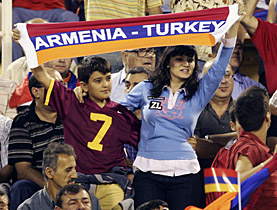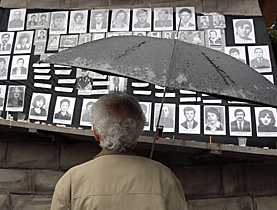Turkey and Armenia set for historic deal

Turkey and Armenia are poised to normalise relations as part of a landmark agreement brokered by Switzerland and strongly backed by the United States.
The deal, meant to reopen a border closed 16 years ago and establish diplomatic ties for the first time, has come under criticism from Armenians at home and abroad ahead of its planned signing in Zurich on Saturday in the presence of US Secretary of State Hillary Clinton.
At the root of their anger is the memory of the massacre of the Armenians in Turkey during and just after the First World War. Turkey has always denied that this was genocide.
Although Turkey recognised Armenia soon after it became independent in 1991, two years later it closed its border with its eastern neighbour to protest at the Armenian invasion of Nagorno-Karabakh, a mountainous enclave in southwest Azerbaijan.
The prospect of ending a century of hostility has done little to mollify the agreement’s opponents.
A week-long charm offensive by Armenian President Serzh Sargsyan sparked protests among Armenians in Lebanon, France, the US and Russia, where he has been branded a traitor.
The president of Switzerland’s own Armenian association has accused Sargsyan of treating his country and people with disdain. The president was displaying “a lack of political maturity”, Sarkis Shahinian told swissinfo.ch.
Armenians abroad – estimated at 5.7 million – outnumber the 3.2 million living in Armenia itself, one of the smallest of the ex-Soviet republics. Two million live in Russia, 1.4 million in the US, followed by smaller communities in Georgia and France. About 65,000 Armenians live in Turkey.
There are thought to be between 4,000 and 5,000 people of Armenian descent living in Switzerland.
Turkey’s rightwing nationalist movement accuses the government of having sold off the country’s interests and those of Azerbaijan, also a Muslim state. The two countries have referred to themselves as “one nation, two states” for 90 years.
Concessions
Nationalists in Armenia are talking of betrayal, saying under this agreement it’s not even certain that the blockage imposed by Turkey on Armenia 16 years ago will be lifted, seeing that the Turkish prime minister recently said he was linking the reopening of the borders with the withdrawal of Armenian soldiers from Nagorno-Karabakh – in violation of the terms of the agreement.
Fighting between Armenian and Azerbaijani soldiers continues to claim lives in the disputed area, inhabited primarily by ethnic Armenians and still occupied by Armenia.
“Everything is happening within its natural course,” Turkey’s foreign minister, Ahmet Davutoglu, said of Armenian protests. “Don’t listen to the voices from the diaspora. There is no surprise development for us.”
For the Turks, Saturday’s deal will mark a major concession. The country has always linked relations with Armenia to a peace deal in Nagorno-Karabakh. Talks between Armenia and Azerbaijan are ongoing.
For Armenia, the deal solidifies the widely reviled border arrangement with Turkey, established in 1921 as part of the Treaty of Kars.
More significantly, the proposed agreement will address the most contentious issue between the two sides: the 1915 massacre of up to 1.5 million Armenians by Ottoman Turks.
Turkey and Armenia will attempt to foster reconciliation without immediately trying to reach a conclusion over whether the killings amounted to genocide, as claimed by Armenia and many international experts.
“I am afraid that this addresses the issue from a historical perspective, not a criminal one, and excludes any compensation,” Shahinian said.
Ratification
Parliaments in both countries must ratify the deal. The parties of both presidents hold majorities in their respective parliaments but the issue of Nagorno-Karabakh delays any implementation.
On Wednesday a senior Turkish politician said that a lack of progress by Azerbaijan and Armenia towards resolving their own dispute would affect Turkey’s parliamentary approval.
“If there’s progress on these issues, parliament’s endorsement of the protocols can be extremely rapid,” Murat Mercan, chairman of the ruling AK Party parliamentary foreign affairs committee, told Reuters.
One thing that’s already been agreed on: sport. Focus from the diplomatic ceremony in Zurich will shift four days later to a football match between the two countries.
Armenian President Sargsyan has said he would go to the October 14 game if there is progress towards opening their joint border. Turkish President Abdullah Gül visited Armenia for the first game last year.
Ariane Bonzon, swissinfo.ch and agencies (Adapted from French by Justin Häne)
The first protocol sets out the principle of restoring diplomatic relations. It enshrines territorial integrity and the recognition of existing borders.
The second protocol deals with economic, technological, cultural and historic relationships between the two countries. It establishes a committee of experts to investigate the deaths of 1.5 million Armenians in 1915.
The status of Nagorno-Karabakh has been disputed since 1918, when Armenia and Azerbaijan became independent from the Russian empire.
Soviet rule was imposed in the south Caucasus in 1921, and predominantly Armenian-populated Nagorno-Karabakh became an autonomous region within the Azeri Soviet republic.
In 1988, the Nagorno-Karabakh authorities demanded to be transferred to the Armenian republic. The Soviet Union collapsed in 1991 and Nagorno-Karabakh, in a referendum boycotted by most of the local Azeri population, declared independence.
Sporadic fighting between Armenians and Azerbaijanis erupted in war in 1991. Ethnic Armenian forces, backed by Armenia, drove back Azerbaijani forces and took control of Nagorno-Karabakh and districts surrounding it.
A ceasefire was signed in 1994, but there are frequent violations. The front line is monitored by a single representative of the Organisation for Security and Cooperation in Europe and five field assistants.
Turkey and Armenia are pursuing rapprochement after almost a century of animosity stemming from the First World War mass killings of Armenians by Ottoman Turks.
The neighbours have agreed accords on bilateral relations and opening their border, which Ankara closed in 1993 in solidarity with ally Azerbaijan.
Turkey had previously ruled out opening the border until Armenia made concessions on the territory.

In compliance with the JTI standards
More: SWI swissinfo.ch certified by the Journalism Trust Initiative












You can find an overview of ongoing debates with our journalists here . Please join us!
If you want to start a conversation about a topic raised in this article or want to report factual errors, email us at english@swissinfo.ch.